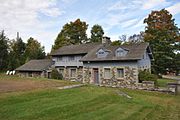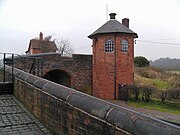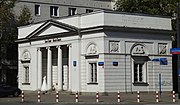Tollhouse: Difference between revisions
m Jerm moved page Toll houses of the United Kingdom to Tollhouse without leaving a redirect: Consensus for move request resulted in "Page moved". |
Removing notice of move discussion |
||
| Line 1: | Line 1: | ||
| ⚫ | |||
<noinclude>{{User:RMCD bot/subject notice|1=Toll house|2=Talk:Toll houses of the United Kingdom#Requested move 25 September 2020 }} |
|||
| ⚫ | |||
A '''tollhouse''' or '''toll house''' is a building with accommodation for a toll collector, beside a tollgate on a [[toll road]] or [[canal]]. |
A '''tollhouse''' or '''toll house''' is a building with accommodation for a toll collector, beside a tollgate on a [[toll road]] or [[canal]]. |
||
Revision as of 22:22, 10 October 2020

A tollhouse or toll house is a building with accommodation for a toll collector, beside a tollgate on a toll road or canal.
History
Many tollhouses were built by turnpike trusts in England, Wales and Scotland during the 18th and early 19th centuries. Those built in the early 19th century often had a distinctive bay front to give the pikeman a clear view of the road and to provide a display area for the tollboard.[1] In 1840, according to the Turnpike Returns in Parliamentary Papers, there were over 5,000 tollhouses operating in England. These were sold off in the 1880s when the turnpikes were closed. Many were demolished but several hundred have survived for residential or other use, with distinctive features of the old tollhouses still visible.
Canal toll houses were built in very similar style to those on turnpikes. They are sited at major canal locks or at junctions. The great age of canal-building in Britain was in the 18th century, so the majority exhibit the typical features of vernacular Georgian architecture. In the English Midlands, a major area of 18th century canal development, most are of mellow red brick and hexagonal in plan, and tall enough to give the lock keeper a good view of local traffic on the canal. Being small, most have proved unsuitable for occupation, and so are often used as shops or tourist information outlets.[citation needed]
The manager's office in modern toll plazas in the United States is also referred to as a "toll house" even though it is not used as a residence.[citation needed]
Gallery
-
Toll House in Burke, Vermont. This house was home to the toll collector for the road on Burke Mountain.
-
Toll house at the Bratch Locks, Wombourne, on the Staffordshire and Worcestershire Canal, circa 1772
-
Rogatka Grochowska in Artur Zawisza Square, Warsaw, dismantled in 1942
See also
- Tollkeeper's cottages in Ontario
- Tholsel, from the English word tolsey
- Tollbooth
References
- ^ Tollhouse architecture, turnpke.org.uk, archived from the original on 18 September 2014, retrieved 18 September 2014
- ^ Historic England, "Toll House, Smethwick (1077114)", National Heritage List for England, retrieved 18 September 2014
Bibliography
Tollhouses in England:
- Haynes, R. & Slocombe, I. (2004) Wiltshire Toll Houses, publ. Hobnob Press, Salisbury. (ISBN 0946418-21-7)
- Kanefsky, J. (1976) Devon Tollhouses, Exeter Ind Arch. Group, University of Exeter (ISBN 978-0-9501778-8-5)
- Jenkinson, T, Taylor, P (2009) The Toll-houses of South Devon, Polystar Press (ISBN 978-1-907154-01-0)
- Jenkinson, T, Taylor, P (2010) The Toll-houses of North Devon, Polstar Press (ISBN 978-1-907154-03-4
- Searle, M. (1930), Turnpikes and Toll-bars, publ. Hutchinson
- Taylor, P. (2001) The Toll-houses of Cornwall, publ. The Federation of Old Cornwall Societies. (ISBN 0902660-29-2)
- Taylor, P (2010) The Toll-houses of Essex, Polystar Press (ISBN 978-1-907154-04-1
- Ward, M & A (2011) The Toll House, Medlar Press, Shropshire (ISBN 978-1-907110-18-4)
External links
- British Tollhouses has photographs and maps of some surviving tollhouses in Britain
- English tollhouse database



![Smethwick. What looks like a window opening on the upper floor would hold the tollboard.[2]](/upwiki/wikipedia/commons/thumb/a/a9/Smethwick_toll_house.jpg/176px-Smethwick_toll_house.jpg)
